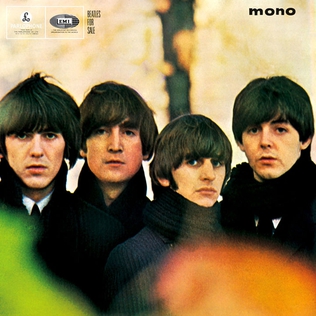
Beatles for Sale is the fourth studio album by the English rock band the Beatles. It was released on 4 December 1964 in the United Kingdom on EMI's Parlophone label. The album marked a departure from the upbeat tone that had characterised the Beatles' previous work, partly due to the band's exhaustion after a series of tours that had established them as a worldwide phenomenon in 1964. Beatles for Sale was not widely available in the US until 1987, when the Beatles' catalogue was standardised for release on CD. Instead, eight of the album's fourteen tracks appeared on Capitol Records' concurrent release, Beatles '65, issued in North America only.
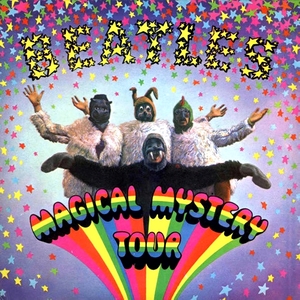
Magical Mystery Tour is a record by the English rock band the Beatles that was released as a double EP in the United Kingdom and an LP in the United States. It includes the soundtrack to the 1967 television film of the same name. The EP was issued in the UK on 8 December 1967 on the Parlophone label, while the Capitol Records LP release in the US and Canada occurred on 27 November and featured an additional five songs that were originally released as singles that year. In 1976, Parlophone released the eleven-track LP in the UK.
The Beatles' bootleg recordings are recordings of performances by the Beatles that have attained some level of public circulation without being available as a legal release. The term most often refers to audio recordings, but also includes video performances. Starting with vinyl releases in the 1970s, through CD issues in the late 1980s, and continuing with digital downloads starting in the mid 1990s, the Beatles have been, and continue to be, among the most bootlegged artists.
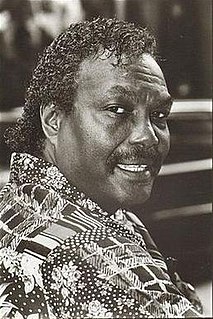
Arthur Alexander was an American country soul songwriter and singer. Jason Ankeny, music critic for AllMusic, said Alexander was a "country-soul pioneer" and that, though largely unknown, "his music is the stuff of genius, a poignant and deeply intimate body of work on par with the best of his contemporaries." Alexander's songs were covered by such stars as the Beatles, the Rolling Stones, Bob Dylan, Gerry and the Pacemakers, Otis Redding, Tina Turner, Pearl Jam, and Jerry Lee Lewis.
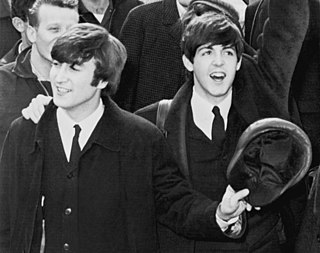
Lennon–McCartney was the songwriting partnership between English musicians John Lennon (1940–1980) and Paul McCartney of the Beatles. It is the best-known and most successful musical collaboration ever by records sold, with the Beatles selling over 600 million records worldwide as of 2004. Between 5 October 1962 and 8 May 1970, the partnership published approximately 180 jointly credited songs, of which the vast majority were recorded by the Beatles, forming the bulk of their catalogue.

"Ticket to Ride" is a song by the English rock band the Beatles, written by John Lennon, with contributions from Paul McCartney, and credited to Lennon–McCartney. Issued as a single in April 1965, it became the Beatles' seventh consecutive number 1 hit in the United Kingdom and their third consecutive number 1 hit in the United States, and similarly topped national charts in Canada, Australia and Ireland. The song was included on their 1965 album Help! Recorded at EMI Studios in London in February that year, the track marked a progression in the Beatles' work through the incorporation of drone and harder-sounding instrumentation relative to their previous releases. Among music critics, Ian MacDonald describes the song as "psychologically deeper than anything the Beatles had recorded before" and "extraordinary for its time".
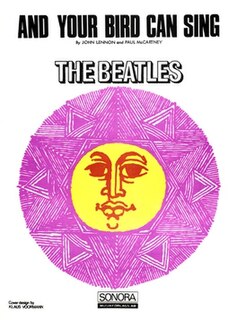
"And Your Bird Can Sing" is a song by the English rock band the Beatles. It was released on their 1966 album Revolver, apart from in the United States and Canada, where it instead appeared on Yesterday and Today. The song was written mainly by John Lennon and credited to Lennon–McCartney. The recording features an extended dual-guitar melody, played by George Harrison and Paul McCartney, which anticipated the harmonised guitar arrangements commonly used by Southern rock, hard rock and heavy metal bands.
"Across the Universe" is a song by the English rock band the Beatles. It was written by John Lennon and credited to Lennon–McCartney. The song first appeared on the 1969 various artists' charity compilation album No One's Gonna Change Our World and later, in a different form, on their 1970 album Let It Be, the group's final released album. The original version featured on two different albums both titled Rarities: a 1978 British release and a 1980 US release. It was also included on their 1988 album Past Masters, Volume Two. The song has been covered by many artists, including David Bowie on his 1975 album Young Americans, which featured contributions from Lennon.

Live! at the Star-Club in Hamburg, Germany; 1962 is a double album featuring live performances by the English rock band the Beatles, recorded in late December 1962 at the Star-Club during their final Hamburg residency. The album was released in 1977 in two different versions, comprising a total of 30 songs by the Beatles.

"Baby's in Black" is a song by the English rock band the Beatles, co-written by John Lennon and Paul McCartney. It appears on the United Kingdom album Beatles for Sale and on the United States album Beatles '65, both released in 1964.
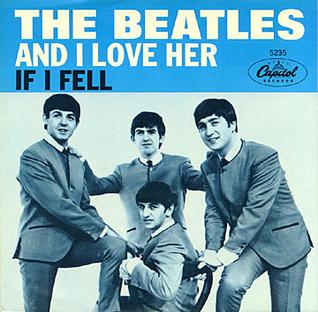
"And I Love Her" is a song recorded by English rock band the Beatles, written primarily by Paul McCartney and credited to the Lennon–McCartney partnership. It is the fifth track of their third UK album A Hard Day's Night and was released 20 July 1964, along with "If I Fell", as a single release by Capitol Records in the United States, reaching No. 12 on the Billboard Hot 100.

"Little Child" is a song by the English rock band the Beatles from their 1963 UK album With the Beatles. It was written by John Lennon and Paul McCartney for Ringo Starr, but Starr was instead given "I Wanna Be Your Man" as his album song.
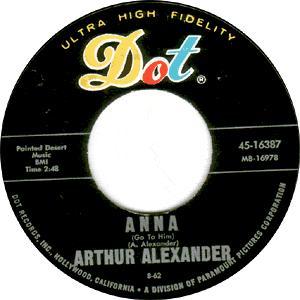
"Anna ", or simply "Anna", is a song written and originally recorded by Arthur Alexander. His version was released as a single by Dot Records on September 17, 1962. A cover version was performed by the Beatles and included on their 1963 debut album Please Please Me. A Spanish cover version was performed by Grupo Pegasso and included on their 1996 album Amor Vendido, Vol. 4 , followed by an English Version in 2019.

"I'm a Loser" is a song by the English rock band the Beatles, originally released on Beatles for Sale in the United Kingdom, later released on Beatles '65 in the United States, both in 1964. Written by John Lennon, and credited to Lennon–McCartney, it was considered for release as a single until Lennon wrote "I Feel Fine".

"All Together Now" is a song by the English rock band the Beatles written primarily by Paul McCartney and credited to the Lennon–McCartney partnership. The song was recorded during the band's Magical Mystery Tour period, but remained unreleased until it was included on the Yellow Submarine soundtrack. It was released as a single in 1972 in European countries such as France and Germany, backed by "Hey Bulldog".
"If You've Got Trouble" is a song written by Lennon–McCartney and recorded by the Beatles on 18 February 1965 with Ringo Starr singing the lead vocal. The song was intended to be Starr's vocal appearance on the Help! album and the Help! film, but the Beatles were not happy with the recording and later chose "Act Naturally" instead. "If You've Got Trouble" remained unreleased until Anthology 2 in 1996.
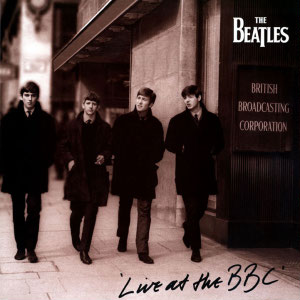
Live at the BBC is a 1994 compilation album featuring performances by the Beatles that were originally broadcast on various BBC Light Programme radio shows from 1963 to 1965. The mono album, available in multiple formats but most commonly as a two-CD set, consists of 56 songs and 13 tracks of dialogue; 30 of the songs had never been issued previously by the Beatles. It was the first official release by the Beatles of previously unreleased performances since The Beatles at the Hollywood Bowl in 1977 and the first containing previously unreleased songs since their final studio album, Let It Be, in 1970.

"Crying, Waiting, Hoping" is a song written by Buddy Holly. It was released in 1959 as the B-side to "Peggy Sue Got Married". Three versions of Holly's recording were released: the 1959 commercial release, the 1964 reissue with different orchestration, and Holly's original, private home recording.
Soldier of Love or Soldiers of Love may refer to:

"Where Have You Been " is a song written by Barry Mann and Cynthia Weil.
















